Related Research Articles

Cyril M. Kornbluth was an American science fiction author and a member of the Futurians. He used a variety of pen-names, including Cecil Corwin, S. D. Gottesman, Edward J. Bellin, Kenneth Falconer, Walter C. Davies, Simon Eisner, Jordan Park, Arthur Cooke, Paul Dennis Lavond, and Scott Mariner.

James Benjamin Blish was an American science fiction and fantasy writer. He is best known for his Cities in Flight novels and his series of Star Trek novelizations written with his wife, J. A. Lawrence. His novel A Case of Conscience won the Hugo Award. He is credited with creating the term "gas giant" to refer to large planetary bodies.

Murray Leinster was a pen name of William Fitzgerald Jenkins, an American writer of genre fiction, particularly of science fiction. He wrote and published more than 1,500 short stories and articles, 14 movie scripts, and hundreds of radio scripts and television plays.

Damon Francis Knight was an American science fiction author, editor, and critic. He is the author of "To Serve Man", a 1950 short story adapted for The Twilight Zone. He was married to fellow writer Kate Wilhelm.
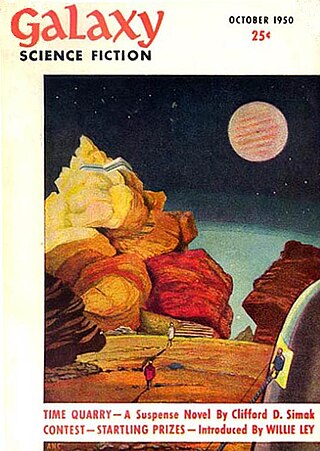
Galaxy Science Fiction was an American digest-size science fiction magazine, published in Boston from 1950 to 1980. It was founded by a French-Italian company, World Editions, which was looking to break into the American market. World Editions hired as editor H. L. Gold, who rapidly made Galaxy the leading science fiction magazine of its time, focusing on stories about social issues rather than technology.
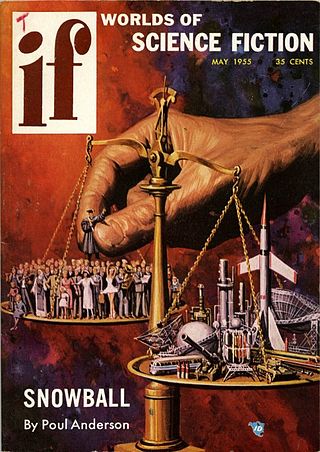
If was an American science fiction magazine launched in March 1952 by Quinn Publications, owned by James L. Quinn.
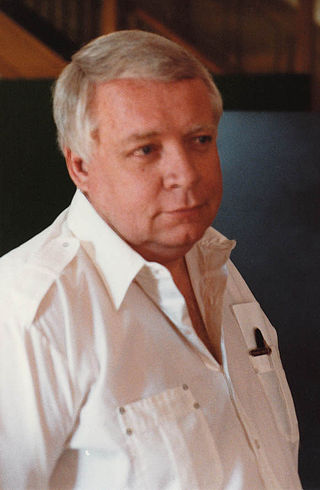
Algirdas Jonas "Algis" Budrys was a Lithuanian-American science fiction author, editor, and critic. He was also known under the pen names Frank Mason, Alger Rome in collaboration with Jerome Bixby, John A. Sentry, William Scarff, and Paul Janvier. In 1960, he authored Rogue Moon, a novel.
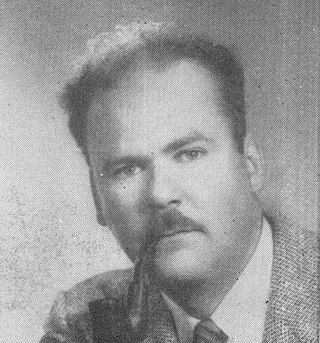
Dallas McCord "Mack" Reynolds was an American science fiction writer. His pen names included Dallas Ross, Mark Mallory, Clark Collins, Dallas Rose, Guy McCord, Maxine Reynolds, Bob Belmont, and Todd Harding. His work focused on socioeconomic speculation, usually expressed in thought-provoking explorations of utopian societies from a radical, sometime satiric perspective. He was a popular author from the 1950s to the 1970s, especially with readers of science fiction and fantasy magazines.

Judith Josephine Grossman, who took the pen-name Judith Merril around 1945, was an American and then Canadian science fiction writer, editor and political activist, and one of the first women to be widely influential in those roles.

George Oliver Smith was an American science fiction author. He is not to be confused with George H. Smith, another American science fiction author.

Daniel Francis Galouye was an American science fiction writer. During the 1950s and 1960s, he contributed novelettes and short stories to various digest size science fiction magazines, sometimes writing under the pseudonym Louis G. Daniels.
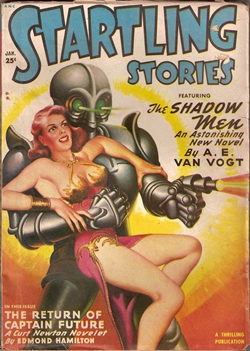
Startling Stories was an American pulp science fiction magazine, published from 1939 to 1955 by publisher Ned Pines' Standard Magazines. It was initially edited by Mort Weisinger, who was also the editor of Thrilling Wonder Stories, Standard's other science fiction title. Startling ran a lead novel in every issue; the first was The Black Flame by Stanley G. Weinbaum. When Standard Magazines acquired Thrilling Wonder in 1936, it also gained the rights to stories published in that magazine's predecessor, Wonder Stories, and selections from this early material were reprinted in Startling as "Hall of Fame" stories. Under Weisinger the magazine focused on younger readers and, when Weisinger was replaced by Oscar J. Friend in 1941, the magazine became even more juvenile in focus, with clichéd cover art and letters answered by a "Sergeant Saturn". Friend was replaced by Sam Merwin Jr. in 1945, and Merwin was able to improve the quality of the fiction substantially, publishing Arthur C. Clarke's Against the Fall of Night, and several other well-received stories.
The Golden Age of Science Fiction, often identified in the United States as the years 1938–1946, was a period in which a number of foundational works of science fiction literature appeared. In the history of science fiction, the Golden Age follows the "pulp era" of the 1920s and 1930s, and precedes New Wave science fiction of the 1960s and 1970s. The 1950s are, in this scheme, a transitional period. Robert Silverberg, who came of age then, saw the 1950s as the true Golden Age.
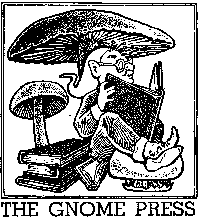
Gnome Press was an American small-press publishing company primarily known for publishing many science fiction classics. Gnome was one of the most eminent of the fan publishers of SF, producing 86 titles in its lifespan — many considered classic works of SF and Fantasy today. Gnome was important in the transitional period between Genre SF as a magazine phenomenon and its arrival in mass-market book publishing, but proved too underfunded to make the leap from fan-based publishing to the professional level. The company existed for just over a decade, ultimately failing due to inability to compete with major publishers who also started to publish science fiction. In its heyday, Gnome published many of the major SF authors, and in some cases, as with Robert E. Howard's Conan series and Isaac Asimov's Foundation series, was responsible for the manner in which their stories were collected into book form.
The science fiction writer Robert A. Heinlein (1907–1988) was productive during a writing career that spanned the last 49 years of his life; the Robert A. Heinlein bibliography includes 32 novels, 59 short stories and 16 collections published during his life. Four films, two TV series, several episodes of a radio series, at least two songs and a board game derive more or less directly from his work. He wrote the screenplay for Destination Moon (1950). Heinlein also edited an anthology of other writers' science fiction short stories.
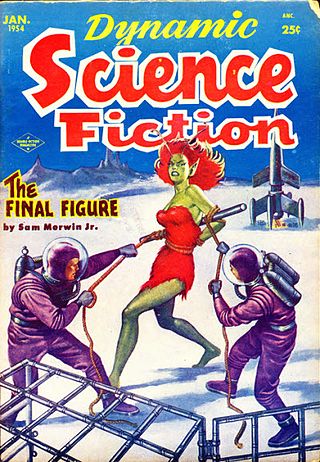
Samuel Kimball Merwin Jr. was an American mystery fiction writer, editor and science fiction author. His pseudonyms included Elizabeth Deare Bennett, Matt Lee, Jacques Jean Ferrat and Carter Sprague.
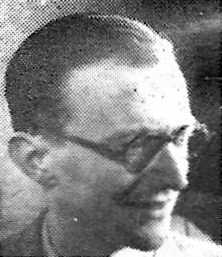
James Murdoch MacGregor was a Scottish journalist and author best known for writing science fiction under the pen name J.T. McIntosh.
This is an incomplete list of works by American space opera and science fiction author Frederik Pohl, including co-authored works.

The Best of C. M. Kornbluth is a collection of science fiction and fantasy short stories by American author C. M. Kornbluth, edited by Frederik Pohl. It was first published in hardback by Nelson Doubleday in October 1976 and in paperback by Ballantine Books in January 1977, as a volume in its Classic Library of Science Fiction. A second hardcover edition was issued by Taplinger in November 1977, and an ebook edition by Faded Page in December 2017.
The year 1953 was marked, in science fiction, by the following events.
References
- ↑ Frederik Pohl (1978). The Way the Future Was: A Memoir. Del Rey. p. 224. ISBN 0-345-26059-7.
- ↑ James Ashe (December 1967). "Fred Pohl Reveals Losses on Magazines". Science Fiction Times. No. 449. p. 01.